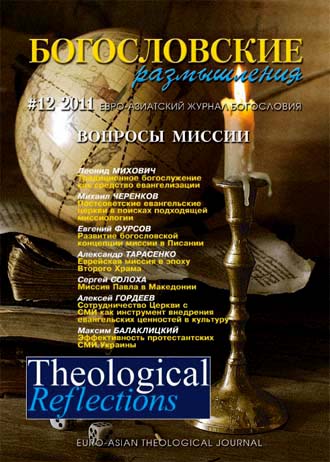Toward Appropriate Missiology for Post-Soviet Evangelicals: Global Missiological Trends and Local Realities
Keywords:
Post-Soviet Evangelicals, Missiology, Appropriate missiologyAbstract
The future of missions in post-Soviet countries is tied to the formation/development of an appropriate, indigenous, authentic, effective, comprehensive missiological paradigm, which is based on Biblical principles, opens up into a holistic theoretical system, synthesizes the historical experience of churches and various theological approaches, takes into account the local context, and is oriented towards the needs and issues of local communities. Each of these requirements is presented as necessary and, at the same time, remains little-thought-out and unfulfilled in the missionary practice of traditional Evangelical churches. As it turns out, in the era of freedom the church cannot fulfill its missionary calling by remaining marginal in society. It is clear that comleting new missions tasks is left to the new generation of Christian leaders, formed after the collapse of the USSR, and therefore open to changes in churches and moved by the grandiose vision of the Evangelical reformation in their countries, seeing beyond their own noses, beyond church walls and denominational interests, to the epicenter of community life and the fates of ordinary people, there where God is working and where we can become participants in His mission, where appropriate missiology for Christians becomes appropriate Christianity for non-Christians.Downloads
How to Cite
Issue
Section
License
Copyright (c) 2020 Michael CHERENKOV

This work is licensed under a Creative Commons Attribution-NonCommercial 4.0 International License.
All articles published in the Journal are distributed under a Creative Commons Attribution-NonCommercial 4.0 International License
By submitting an article for publication in Theological Reflections: Eastern European Journal of Theology the author grants the editors the right to publish the article and distribute it in electronic and print form.
The author reserves all copyrights and the right to use the materials of the article in whole or in part for educational purposes, to write his own dissertations, to prepare abstracts, conference reports, oral presentations, etc., as well as post electronic copies of articles (including the final electronic version downloaded from the journal’s official website) on non-commercial web-resources without the consent of the editorial board and founders.



